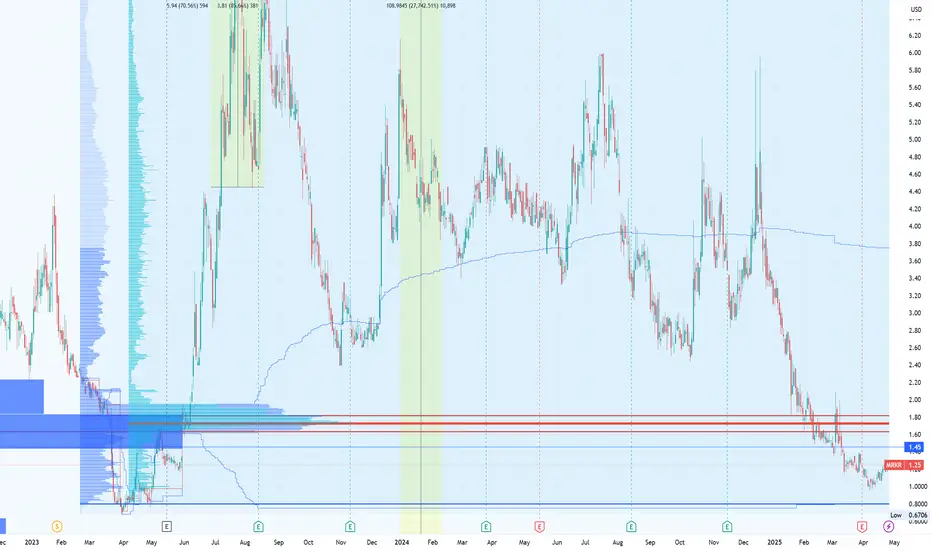Marker Therapeutics (NASDAQ: MRKR) is a biotech company focused on multi-antigen T cell (MAR-T) therapies targeting hematological malignancies and solid tumors.
The company recently published its FY2024 results, highlighting promising clinical progress but also significant financial challenges.
As of the end of 2024, Marker reported $19.2 million in cash, with an annual operational burn rate of approximately $10.9 million. This cash position suggests a financial runway extending through the first quarter of 2026, assuming no additional financing. However, the company issued a "going concern warning" in its financial statements, flagging the risk of cash depletion within 12–15 months.
On the clinical side, preliminary data from the APOLLO trial for its lead candidate MT-601 in patients with relapsed/refractory lymphoma post-CAR-T therapy are encouraging, with an objective response rate (ORR) of 78% and a complete response (CR) rate of 44%. Meanwhile, the pancreatic cancer program for MT-601, backed by over $11.5 million in non-dilutive NIH and CPRIT grants, is set to enter clinical development in the second half of 2025. An additional milestone was the approval of "neldaleucel" as the official generic name for MT-601, marking regulatory progress.
Nevertheless, Marker faces substantial structural risks. These include its heavy reliance on the success of MT-601, the urgent need for new funding within the next year, intense competition in the cellular therapy field, and complete reliance on third-party manufacturers after selling its own production facilities.
From a valuation perspective, two scenarios can be considered. In a conservative scenario, assuming only partial success in the lymphoma program and dilutive fundraising, the estimated enterprise value would be around $24–26 million, corresponding to a theoretical share price of approximately $2.40–2.60.
In an optimistic scenario, assuming full clinical success across both lymphoma and pancreatic programs and effective fundraising, the market valuation could rise to $75–95 million, implying a theoretical share price of about $8.80.
However, adjusting for early-stage biotech risk (estimated success probability of 10–15%), the realistic fair value ranges between $0.90 and $1.30 per share.
In conclusion, Marker Therapeutics represents a high-risk, high-reward investment opportunity, suitable only for highly specialized biotech investors.
The coming months will be critical, with particular focus on updated APOLLO trial data and the company's ability to secure additional funding or strategic partnerships.
The company recently published its FY2024 results, highlighting promising clinical progress but also significant financial challenges.
As of the end of 2024, Marker reported $19.2 million in cash, with an annual operational burn rate of approximately $10.9 million. This cash position suggests a financial runway extending through the first quarter of 2026, assuming no additional financing. However, the company issued a "going concern warning" in its financial statements, flagging the risk of cash depletion within 12–15 months.
On the clinical side, preliminary data from the APOLLO trial for its lead candidate MT-601 in patients with relapsed/refractory lymphoma post-CAR-T therapy are encouraging, with an objective response rate (ORR) of 78% and a complete response (CR) rate of 44%. Meanwhile, the pancreatic cancer program for MT-601, backed by over $11.5 million in non-dilutive NIH and CPRIT grants, is set to enter clinical development in the second half of 2025. An additional milestone was the approval of "neldaleucel" as the official generic name for MT-601, marking regulatory progress.
Nevertheless, Marker faces substantial structural risks. These include its heavy reliance on the success of MT-601, the urgent need for new funding within the next year, intense competition in the cellular therapy field, and complete reliance on third-party manufacturers after selling its own production facilities.
From a valuation perspective, two scenarios can be considered. In a conservative scenario, assuming only partial success in the lymphoma program and dilutive fundraising, the estimated enterprise value would be around $24–26 million, corresponding to a theoretical share price of approximately $2.40–2.60.
In an optimistic scenario, assuming full clinical success across both lymphoma and pancreatic programs and effective fundraising, the market valuation could rise to $75–95 million, implying a theoretical share price of about $8.80.
However, adjusting for early-stage biotech risk (estimated success probability of 10–15%), the realistic fair value ranges between $0.90 and $1.30 per share.
In conclusion, Marker Therapeutics represents a high-risk, high-reward investment opportunity, suitable only for highly specialized biotech investors.
The coming months will be critical, with particular focus on updated APOLLO trial data and the company's ability to secure additional funding or strategic partnerships.
Disclaimer
The information and publications are not meant to be, and do not constitute, financial, investment, trading, or other types of advice or recommendations supplied or endorsed by TradingView. Read more in the Terms of Use.
Disclaimer
The information and publications are not meant to be, and do not constitute, financial, investment, trading, or other types of advice or recommendations supplied or endorsed by TradingView. Read more in the Terms of Use.
